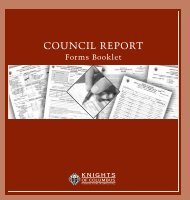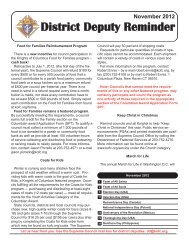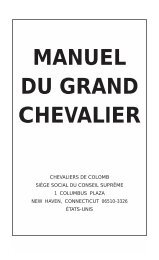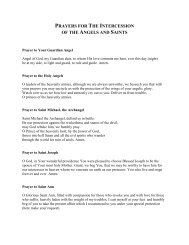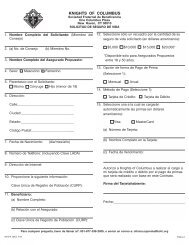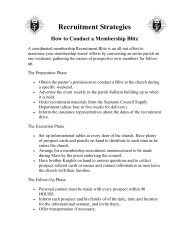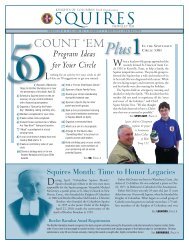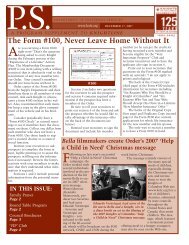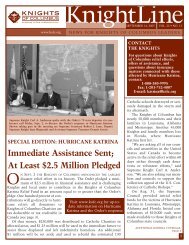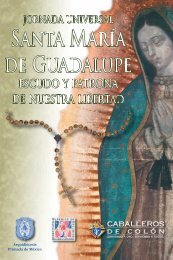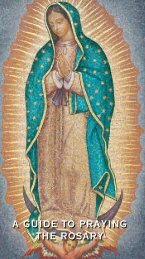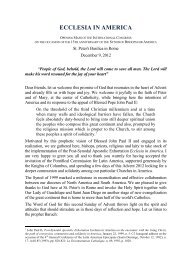CATHOLIC WORD BOOK - Knights of Columbus, Supreme Council
CATHOLIC WORD BOOK - Knights of Columbus, Supreme Council
CATHOLIC WORD BOOK - Knights of Columbus, Supreme Council
You also want an ePaper? Increase the reach of your titles
YUMPU automatically turns print PDFs into web optimized ePapers that Google loves.
constitution issued by Paul VI Jan. 1,<br />
1967, an indulgence is the remission<br />
before God <strong>of</strong> the temporal punishment<br />
due for sins already forgiven as far as their<br />
guilt is concerned, which a follower <strong>of</strong><br />
Christ — with the proper dispositions and<br />
under certain determined conditions —<br />
acquires through the intervention <strong>of</strong> the<br />
Church. An indulgence is partial or<br />
plenary, depending on whether it does<br />
away with either part or all <strong>of</strong> the temporal<br />
punishment due for sin. Both types <strong>of</strong><br />
indulgences can always be applied to the<br />
dead by way <strong>of</strong> suffrage; the actual<br />
disposition <strong>of</strong> indulgences applied to the<br />
dead rests with God. Only one plenary<br />
indulgence can be gained in a single day.<br />
The Apostolic Penitentiary issued a decree<br />
Dec. 14, 1985, granting diocesan bishops<br />
the right to impart — three times a year<br />
on solemn feasts <strong>of</strong> their choice — the<br />
papal blessing with a plenary indulgence<br />
to those who cannot be physically present<br />
but who follow the sacred rites at which<br />
the blessing is imparted by radio or<br />
television transmission. In July, 1986,<br />
publication was announced <strong>of</strong> a new and<br />
simplified Enchiridion Indulgentiarum, in<br />
accord with provisions <strong>of</strong> the revised Code<br />
<strong>of</strong> Canon Law. A revised manual was issued<br />
by the Holy See on Sept. 17, 2000.<br />
Indult: A favor or privilege granted by<br />
competent ecclesiastical authority, giving<br />
permission to do something not allowed<br />
by the common law <strong>of</strong> the Church.<br />
Infallibility: 1) The inability <strong>of</strong> the Church<br />
to err in its teaching, in that she preserves<br />
and teaches the deposit <strong>of</strong> truth as revealed<br />
by Christ; 2) The inability <strong>of</strong> the Roman<br />
Pontiff to err when he teaches ex cathedra in<br />
matters <strong>of</strong> faith or morals, and indicates<br />
-40-<br />
that the doctrine is to be believed by all<br />
the faithful; and 3) the inability <strong>of</strong> the<br />
college <strong>of</strong> bishops to err when speaking in<br />
union with the pope in matters <strong>of</strong> faith and<br />
morals, agreeing that a doctrine must be<br />
held by the universal Church, and the<br />
doctrine is promulgated by the Pontiff.<br />
Infused Virtues: The theological virtues <strong>of</strong><br />
faith, hope, and charity; principles or<br />
capabilities <strong>of</strong> supernatural action, they are<br />
given with sanctifying grace by God rather<br />
than acquired by repeated acts <strong>of</strong> a person.<br />
They can be increased by practice; they are<br />
lost by contrary acts. Natural acquired<br />
moral virtues, like the cardinal virtues <strong>of</strong><br />
prudence, justice, temperance, and<br />
fortitude, can be considered infused in a<br />
person whose state <strong>of</strong> grace gives them<br />
supernatural orientation.<br />
Inquisition: A tribunal for dealing with<br />
heretics, authorized by Gregory IX in<br />
1231 to search them out, hear and judge<br />
them, sentence them to various forms <strong>of</strong><br />
punishment, and in some cases to hand<br />
them over to civil authorities for<br />
punishment. The Inquisition was a<br />
creature <strong>of</strong> its time when crimes against<br />
faith, which threatened the good <strong>of</strong> the<br />
Christian community, were regarded also<br />
as crimes against the state, and when<br />
heretical doctrines <strong>of</strong> such extremists as<br />
the Cathari and Albigensians threatened<br />
the very fabric <strong>of</strong> society. The institution,<br />
which was responsible for many excesses,<br />
was most active in the second half <strong>of</strong> the<br />
13th century.<br />
Inquisition, Spanish: An institution<br />
peculiar to Spain and the colonies in<br />
Spanish America. In 1478, at the urging <strong>of</strong><br />
King Ferdinand, Pope Sixtus IV approved



